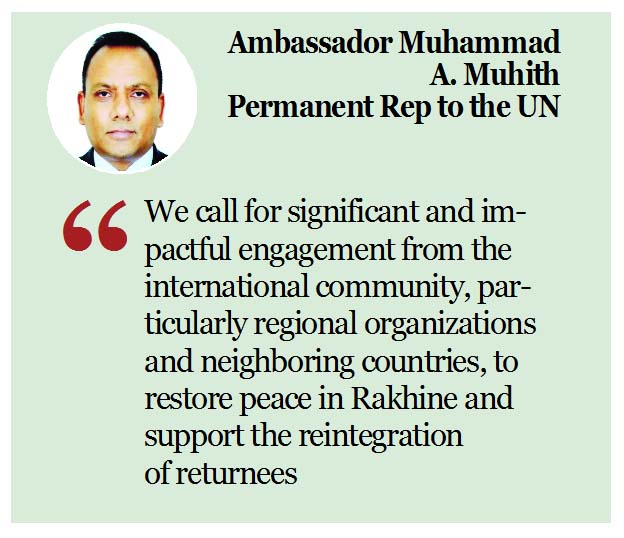
Staff Reporter :
Bangladesh has called on the Security Council to swiftly address the Rohingya crisis, emphasizing the challenges stemming from delays in initiating the repatriation of these persecuted individuals to Myanmar.
“Amid the unresolved crisis of 2017, the Rohingya Muslims in Rakhine are now facing new dangers as conflicts between the Myanmar military and the Arakan Army escalate,” stated Ambassador Muhammad A. Muhith, Bangladesh’s Ambassador and Permanent Representative to the United Nations, during a Security Council session on Friday, as noted in a press release.
His remarks were part of the Open Briefing on Myanmar, hosted by the Maltese Presidency, to deliberate on the recent surge in violence in Rakhine State and its impact on civilians, particularly the Rohingya minority.
The briefing included insights from Khalid Khiari, the Assistant Secretary-General at the Department of Political and Peacebuilding Affairs, and Lisa Doughten, Director at the UN Office for the Coordination of Humanitarian Affairs. Representatives from Malaysia, Indonesia, and Bangladesh also addressed the Council.
Ambassador Muhith stressed that the recent escalation in Rakhine has hindered the repatriation process, which he identified as the ultimate resolution to the Rohingya dilemma.
He expressed optimism for the resumption of the repatriation process once conditions permit and urged Myanmar to show real political willingness to cooperate with Bangladesh under the bilateral return agreements signed in 2017 and 2018.
“We call for significant and impactful engagement from the international community, particularly regional organizations and neighboring countries, to restore peace in Rakhine and support the reintegration of returnees,” he added.
Referencing UN Security Council Resolution 2669, Ambassador Muhith highlighted the necessity of creating a conducive environment in Rakhine and addressing the deep-rooted vulnerabilities among the Rohingya, largely due to Myanmar’s discriminatory legal and political structures.

“Without tackling these root causes, bilateral and regional efforts are likely to fall short,” he remarked.
Ambassador Muhith laid out several expectations for resolving the crisis, including enhancing the UN’s presence in Myanmar, consistent reporting on the execution of Security Council resolution 2669, accountability for crimes against Rohingya Muslims and ongoing violations of international humanitarian law, and the prompt realization of key agreements and recommendations.
He also stressed the importance of international support in fostering a sustainable environment for the reintegration of Rohingya into Myanmar society.
Highlighting the adverse social, economic, environmental, and security repercussions on Bangladesh from the prolonged presence of Rohingyas, Ambassador Muhith appealed to the Council for focused action on the Rakhine situation and a comprehensive, enduring solution to the Rohingya crisis.
Other speakers expressed grave concerns about the escalating conflict and violence in Myanmar, urging the authorities to tackle the root causes of conflict in Rakhine and facilitate the voluntary, safe, dignified, and sustainable return of all displaced Rohingyas and Internally Displaced Persons (IDPs).
They also advocated for increased international solidarity and support for the UN and ASEAN’s peace efforts in Myanmar, in alignment with Security Council Resolution 2669.
Commending Bangladesh for its humanitarian leadership in hosting over a million Rohingyas, the speakers called for further support for the humanitarian efforts in Cox’s Bazar until the displaced population can safely return.

